DEX Aggregator Fee Calculator
This tool estimates potential savings when using CRODEX's aggregator vs. direct DEX swaps.
When it comes to niche crypto platforms, CRODEX is a decentralized exchange (DEX) aggregator launched in 2022 that lets users compare and trade across multiple liquidity sources from a single interface. It also issues its own native coin, CRX, which serves both as a utility token on the platform and as a speculative asset. If you’re wondering whether CRODEX is worth a look, this review breaks down the exchange’s core features, token economics, security posture, and how it stacks up against the big DEX players.
TL;DR
- CRODEX is a boutique DEX aggregator with only 9 supported coins and 11 trading pairs.
- The native CRX token has a fixed supply of 100,000 and a market cap around $75k, making it highly speculative.
- Aggregator functionality can fetch better prices than a single DEX, but liquidity is limited compared to Uniswap or 1inch.
- To trade you need a Web3 wallet (MetaMask, Trust Wallet, etc.) and enough native gas to cover transaction fees.
- Overall, CRODEX suits risk‑tolerant traders looking for niche token exposure rather than a primary trading hub.
What CRODEX Actually Does
The platform’s standout feature is its exchange aggregator. Instead of routing a swap through a single liquidity pool, CRODEX queries multiple DEXs, pulls the best rates, and executes the trade on the most favorable route. This mirrors services like 1inch or Matcha, but CRODEX limits itself to a curated list of nine cryptocurrencies. The limited selection keeps the UI simple, but it also caps the number of arbitrage opportunities.
Supported Assets and Trading Pairs
As of September 2025, CRODEX lists nine assets: Bitcoin (BTC), Ethereum (ETH), Binance Coin (BNB), Cardano (ADA), Polkadot (DOT), Solana (SOL), Litecoin (LTC), Ripple (XRP), and its own CRX. These combine into eleven active pairs, the most popular being ETH/CRX, BTC/ETH, and BNB/USDT (via a wrapped stablecoin on the underlying chain). Compared with giant DEXs that host thousands of pairs, CRODEX feels more like a specialty boutique-great for beginners who don’t want to be overwhelmed, but restrictive for power traders.
Native Token: CRX
The CRX token is the engine behind CRODEX’s incentive model. All 100,000 tokens are already in circulation, giving it a perfectly capped supply. Its price has swung wildly: an all‑time high of $111.08 (USD) versus a recent price near $0.75. The market cap hovers around $75,130, placing CRX squarely in the micro‑cap category. Volatility aside, holding CRX can grant lower fees on the platform and voting rights on future governance proposals, but those benefits are modest compared with the token’s price risk.
How to Buy CRX
CRX isn’t listed on major centralized exchanges, but you can still pick it up through a few routes:
- Binance: Create a free account, fund it with USDT or BUSD, then swap for CRX on the spot market.
- Kriptomat: European users can buy CRX directly with euros (minimum €15). The platform handles the KYC and sends the token to your wallet.
- MEXC: A spot market for CRX exists here; you’ll need to deposit a base currency (USDT, BUSD) and place a limit or market order.
After purchase, withdraw the tokens to a compatible Web3 wallet (MetaMask, Trust Wallet, etc.) before interacting with CRODEX.
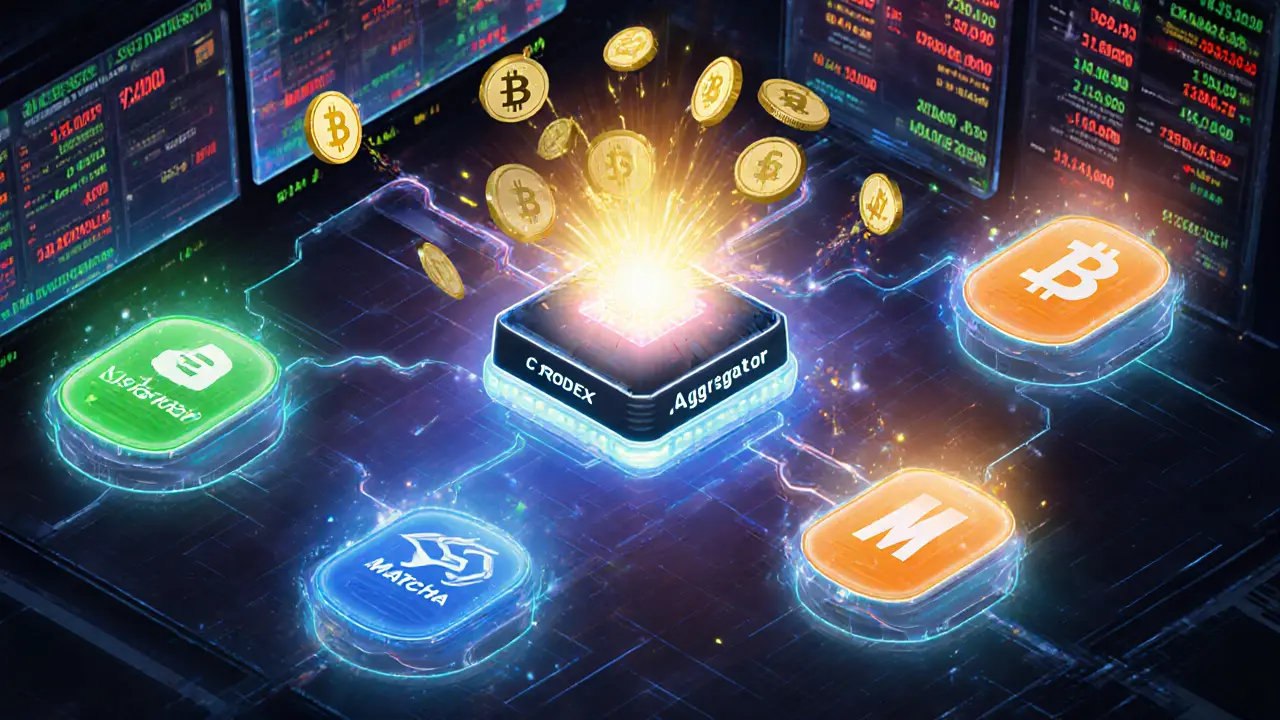
Security and Regulatory Snapshot
Because CRODEX is a decentralized protocol, it does not hold user funds in a custodial vault. Your assets stay in your own wallet, and the smart contracts execute trades automatically. This reduces the risk of exchange hacks but introduces smart‑contract risk-any bug could potentially lock or drain funds. To date, CRODEX’s contracts have not undergone an extensive third‑party audit, which is a red flag for risk‑aware traders.
Regulatory exposure is minimal because the platform doesn’t operate a centralized order book. However, users in strict jurisdictions (e.g., the U.S., certain EU states) may still face compliance scrutiny for interacting with DeFi protocols. Always check local crypto regulations before using a DEX aggregator.
Performance Compared to Mainstream DEXs
| Feature | CRODEX | Uniswap | 1inch |
|---|---|---|---|
| Supported Tokens | 9 | 10,000+ | 10,000+ |
| Trading Pairs | 11 | Hundreds of thousands | Hundreds of thousands |
| Aggregator Function | Yes (limited sources) | No (single pool) | Yes (multiple DEXs) |
| Native Token Utility | Fee discounts, governance | None | None |
| 24‑hr Volume (USD) | ~$200k | ~$6B | ~$4B |
| Audit Status | None publicly disclosed | Multiple audits | Multiple audits |
Numbers show CRODEX is a niche player. The aggregator can still fetch better rates than a single pool, but the limited token list means you’ll often find better liquidity on Uniswap or 1inch for mainstream assets.
Pros and Cons at a Glance
- Pros:
- Simple UI focused on a handful of major coins.
- Aggregator can auto‑route trades for price improvement.
- CRX holders enjoy fee rebates and governance voting.
- Cons:
- Very low liquidity; slippage can be high on larger orders.
- Micro‑cap token CRX is extremely volatile.
- No public smart‑contract audit yet.
- Limited token selection compared with mainstream DEXs.
Who Should Consider Using CRODEX?
If you’re a risk‑tolerant trader looking to experiment with a small‑cap token while enjoying a streamlined trading UI, CRODEX can be an interesting sandbox. It’s also handy for users who want an “all‑in‑one” price‑checker without hopping between multiple DEX sites. Conversely, high‑frequency traders, institutional players, or anyone needing deep liquidity should stick with larger DEXs or centralized exchanges.
Step‑by‑Step: Swapping on CRODEX
- Install a Web3 wallet (MetaMask, Trust Wallet, etc.) and fund it with the native blockchain currency (e.g., ETH for Ethereum).
- Navigate to the CRODEX web app and connect your wallet via the “Connect Wallet” button.
- Select the token you want to swap from and the target token (e.g., ETH → CRX).
- The aggregator will display the best route and the estimated price. Review the slippage tolerance settings.
- Confirm the transaction in your wallet. Pay the gas fee and wait for the on‑chain confirmation (usually < 2 minutes on Ethereum).
- Check your wallet balance to ensure the received token appears.
That’s it-no order books, no KYC, just a direct smart‑contract swap.
Future Outlook
CRODEX’s roadmap hints at expanding the token list beyond the current nine, integrating additional liquidity sources, and potentially launching a token‑buy‑back program to support CRX price. Success hinges on gaining community trust through a formal smart‑contract audit and boosting trading volume. Until then, the platform remains a niche aggregator suited for speculative traders.
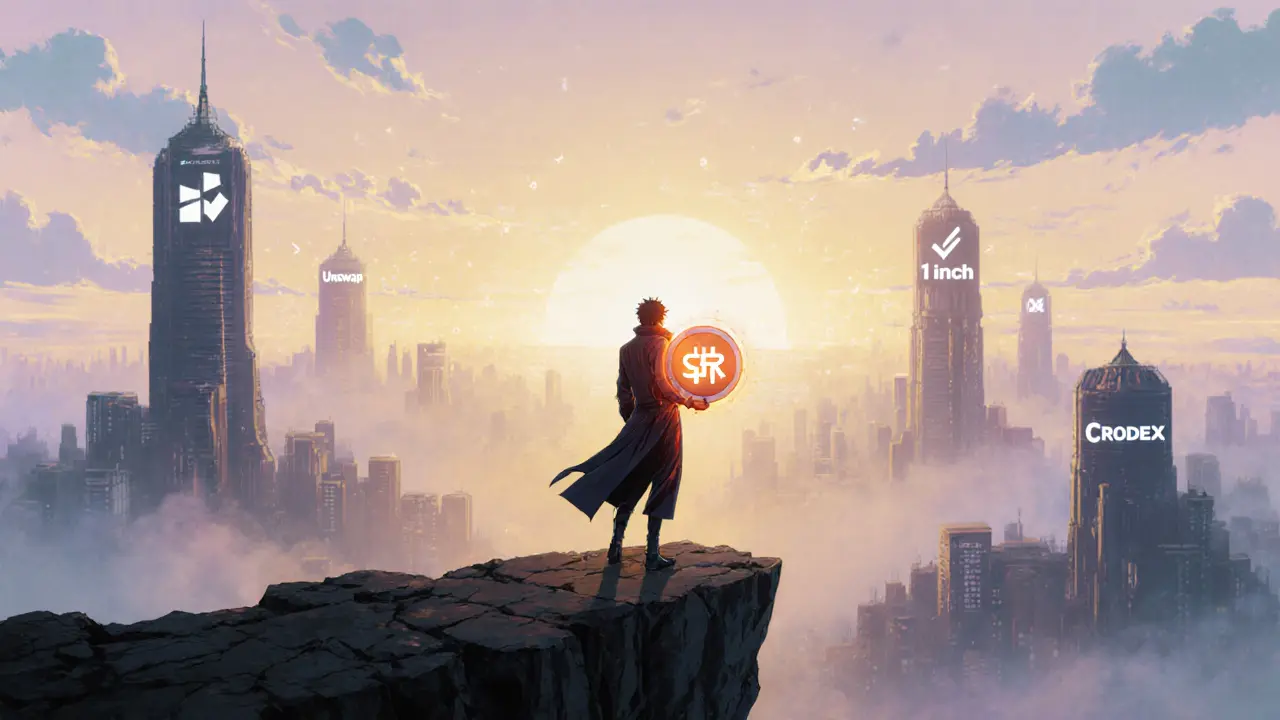
Frequently Asked Questions
Is CRODEX a centralized exchange?
No. CRODEX operates as a decentralized exchange aggregator, meaning trades are executed by smart contracts and users keep custody of their own assets.
How do I get the CRX token?
You can buy CRX on Binance, MEXC, or Kriptomat and then withdraw it to a Web3 wallet. Each platform has its own KYC and fee structure.
What wallets are compatible with CRODEX?
Any wallet that supports Web3 connections-MetaMask, Trust Wallet, Coinbase Wallet, or hardware wallets like Ledger-can connect to CRODEX.
Is there any fee discount for holding CRX?
Yes. Holding CRX grants a modest reduction (typically 10‑15%) on swap fees within the CRODEX platform.
Has CRODEX been audited?
As of September 2025, no public third‑party audit report has been released. Users should treat the platform as experimental and limit exposure.
Can I trade directly from a centralized exchange to CRODEX?
No. You must first withdraw the assets to a personal wallet, then connect that wallet to CRODEX to initiate a trade.
What are the biggest risks when using CRODEX?
Primary risks include low liquidity (leading to slippage), the un‑audited smart‑contract code, and the extreme price volatility of its native CRX token.

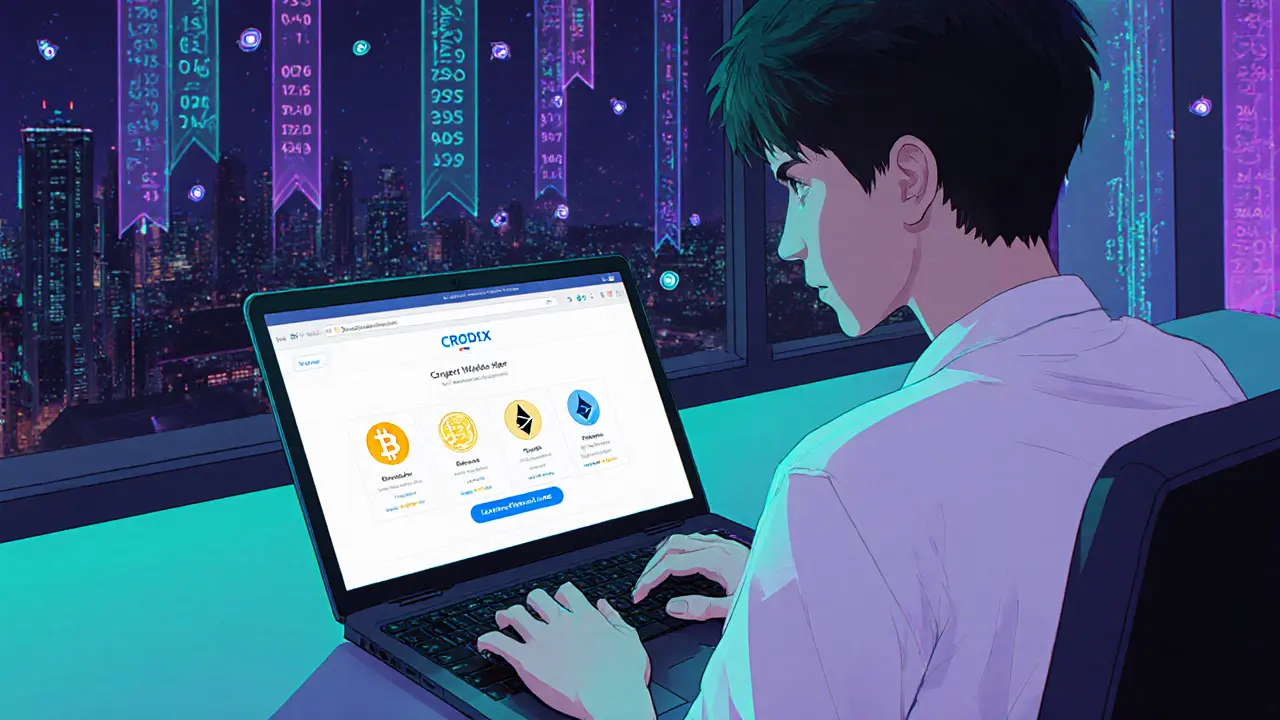
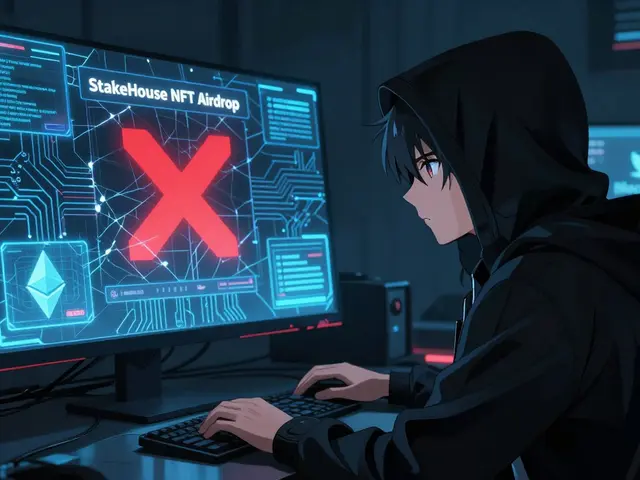
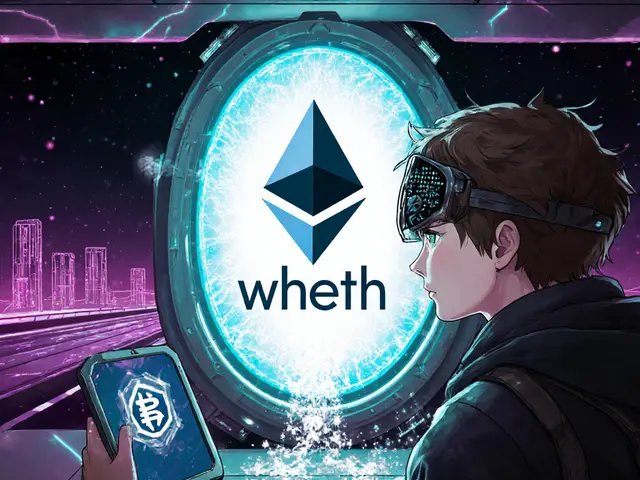



Comments
april harper
May 10, 2025 AT 21:06 PMIn the grand theater of DeFi, CRODEX struts onto the stage like an understudy hoping to steal the spotlight.
It offers a tidy UI, but behind the curtain the liquidity pool is more of a modest side‑stage than a main arena.
The aggregator promises better rates, yet the limited nine tokens keep the plot thin.
For the casual wanderer it might feel like a convenient kiosk, but the drama of slippage remains lurking in the wings.
Ultimately, it’s a cameo worth a glance, not a starring role.
Kate Roberge
May 20, 2025 AT 03:36 AMLooks like another hype‑machine trying to dress up a handful of coin swaps as a revolutionary aggregator.
It slaps a glossy interface over what is essentially a tiny pool of options.
The promise of “better prices” feels more like a marketing whisper than a concrete guarantee.
For anyone not ready to smile through the fine print, it’s a risky detour.
VICKIE MALBRUE
May 29, 2025 AT 10:06 AMHey, this could be a handy tool for newbies.
It lets you see price differences without extra steps.
Keep your expectations low and you’ll avoid disappointment.
Try it out and you might find a small win.
Waynne Kilian
June 7, 2025 AT 16:36 PMi think CRODEX has its charm, especially if you’re looking for a simple entry point.
the lil list of tokens keeps things clear, but also means you might hit a wall when you want more exotic coins.
its ui is clean, but sometimes the slippage numbers feel off, maybe a bug?
overall, it’s a decent stop‑gap while you explore bigger platforms.
Naomi Snelling
June 16, 2025 AT 23:06 PMEveryone talks about “decentralized” like it’s a free pass, but behind the scenes CRODEX could be a data funnel for hidden hands.
the lack of a public audit is a red flag they don’t want you to see.
they’re probably counting on the hype around CRX to lure curious traders into a controlled pond.
stay cautious and keep your wallet keys away from any platform that hides its code.
Michael Wilkinson
June 26, 2025 AT 05:36 AMListen, the aggregator does what it says, but don’t be fooled into thinking it’s a magic bullet.
It will slice fees a bit, yet the limited liquidity can bite you hard on bigger trades.
If you’re serious about capital, stick to high‑volume DEXs or centralized exchanges where the depth is proven.
Use CRODEX for small experiments, not for moving large sums.
Billy Krzemien
July 5, 2025 AT 12:06 PMFor folks just stepping into DeFi, CRODEX can serve as a low‑pressure playground.
Start with tiny amounts, observe how the routing works, and compare the quoted fees to what you’d see on larger platforms.
Remember to always keep a backup of your private keys and never approve contracts you don’t understand.
With careful practice, you’ll gain the confidence to graduate to bigger liquidity sources.
Kate Nicholls
July 14, 2025 AT 18:36 PMCRODEX tries to position itself as a niche aggregator, yet the token list is embarrassingly thin.
The limited pairings mean you’ll often face worse slippage than on Uniswap, defeating the “better price” claim.
Unless you have a specific need for CRX exposure, you’re better off using a more robust router like 1inch.
In short, it’s a marginal tool for a very narrow audience.
MD Razu
July 24, 2025 AT 01:06 AMWhen one contemplates the architecture of modern decentralized finance, CRODEX emerges as a curious experiment in constrained aggregation.
It limits its universe to nine tokens, a decision that some may view as a deliberate minimalist aesthetic, while others perceive it as a glaring omission of market depth.
The aggregator’s algorithm, though not publicly audited, claims to source liquidity from multiple DEXs, promising a modest edge over single‑pool swaps.
This premise, on its face, aligns with the broader trend of routing optimizers that seek to extract the nearest cent of arbitrage.
However, the practical reality is that with such a narrow token basket, the opportunities for meaningful arbitrage are inherently scarce.
For a trader executing a modest $500 swap, the potential savings may be dwarfed by gas costs and slippage, especially on congested networks.
Moreover, the absence of a third‑party audit injects a layer of smart‑contract risk that cannot be ignored, as any undiscovered vulnerability could compromise user funds.
The native CRX token adds another dimension, offering fee discounts and governance rights, yet its micro‑cap volatility introduces speculative danger far beyond the platform’s functional utility.
Liquidity on CRODEX remains thin; order books can be shallow, leading to price impact that erodes any theoretical fee advantage.
From a user experience standpoint, the UI is clean and approachable, which lowers the barrier for newcomers unfamiliar with the intricacies of DeFi.
Yet that simplicity can also mask the underlying complexities of routing decisions, which are opaque to the average user.
In practice, many swaps end up routed through the same handful of pools that larger aggregators already cite, diminishing the uniqueness of CRODEX’s service.
For developers, the limited token list simplifies contract interactions but also restricts opportunities for innovative pairings.
Investors eyeing CRX for speculative gains should weigh the token’s utility against its price volatility and the platform’s modest adoption.
Overall, CRODEX serves as a niche playground-useful for experimentation but insufficient as a primary trading hub for serious volume.
Treat it as a learning tool, keep exposure small, and always have a backup plan for larger, more liquid venues.
Charles Banks Jr.
August 2, 2025 AT 07:36 AMOh great, another “aggregator” that pretends to be smarter than the sum of its parts.
It pulls data from a few DEXs, spits out a price, and hopes you don’t notice the tiny spread left over.
Honestly, if you’re looking for real savings, you’d do better scrolling through the native interfaces yourself.
Ben Dwyer
August 11, 2025 AT 14:06 PMIf you’re just dipping your toes, start with a $10 trade on CRODEX to see how the routing behaves.
Track the fee you’re charged versus a direct swap on a larger DEX, and let the numbers guide your next move.
Lindsay Miller
August 20, 2025 AT 20:36 PMThe platform is easy to use, but keep an eye on gas fees.
Small trades can get eaten up by transaction costs.
Katrinka Scribner
August 30, 2025 AT 03:06 AMOMG, I tried swapping ETH for CRX and felt like I was on a rollercoaster! 😂
The interface looked cute, but the slippage hit harder than my morning coffee. 😅
Still, it’s kind of fun to experiment when you’re not risking big bucks.
Clint Barnett
September 8, 2025 AT 09:36 AMStepping into the world of DEX aggregators can feel like wandering through a bazaar full of glittering promises.
The scent of lower fees and better rates drifts in the air, drawing you toward the stall labeled “CRODEX”.
Yet, when you pull back the curtain, you discover a modest lineup of nine tokens, each waiting for a brave soul to test its depth.
The native CRX token shines like a tiny jewel, offering modest fee rebates, but its price swings like a pendulum in a storm.
If you approach with curiosity and a disciplined mindset, the experience can teach you valuable lessons about routing efficiency and liquidity constraints.
Jacob Anderson
September 17, 2025 AT 16:06 PMSure, because we all needed another micro‑cap token to complicate our portfolios.
Carl Robertson
September 26, 2025 AT 22:36 PMThe hype around CRODEX is nothing more than a fleeting spotlight that will dim once the larger aggregators expose its shortcomings.
Its token list is a dead‑end for serious traders, and the lack of audit is a glaring red flag that no amount of marketing can hide.
Rajini N
October 6, 2025 AT 05:06 AMFor anyone looking to integrate CRODEX into a wallet, the API follows standard EIP‑1193 calls and can be queried via the public endpoint listed in the docs.
Make sure to handle the “estimatedGas” field properly, as the aggregator may add extra steps that increase the gas estimate.
Oreoluwa Towoju
October 15, 2025 AT 11:36 AMCheck the contract address on Etherscan before depositing; it’s the only safe step.
Jason Brittin
October 24, 2025 AT 18:06 PMHa, love the laid‑back vibe of CRODEX – perfect for small tests 😊.
Just remember, even a tiny slip can bite you if the gas spikes, so keep those trades light and watch the numbers. 🚀
Amie Wilensky
October 29, 2025 AT 20:06 PMIndeed, the platform presents a streamlined interface, yet one must consider the underlying risks, including the un‑audited contracts, the volatile nature of CRX, and the limited liquidity, all of which could significantly impact trade outcomes, especially for newcomers.